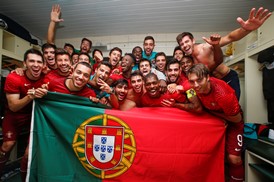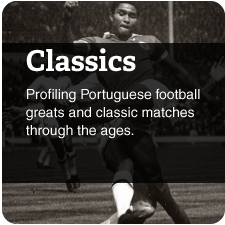Portugal, as a nation in general, has taken great pride in its ability to compete on a level far beyond what one would reasonably expect of it given its population and (lack of) wealth. Much of the world identifies modern Portugal with its football, with the country producing some of the game’s most famous names in Eusébio, Luís Figo and Cristiano Ronaldo.
Eusébio’s exploits at the 1966 World Cup in England showcased a nation that was on the verge of breaking free of the shackles of dictatorship, while the original Golden Generation that emerged at the beginning of the 21st century revealed an increasingly confident country from the footballing point of view.
But since the 2006 World Cup – Euro 2012 apart – results have not been so positive. A Seleçao das Quinas has only made one semi-final at senior level in four major tournaments, and often struggled to qualify. Portugal’s performance in Brazil this past summer reinforced the perception that the squad is in desperate need of renewal.
Turning point
Fortunately there is a new generation of very promising emerging footballers. The Under-20 World Cup in 2011 marked the start of a series of good results at youth level. Managed by current senior team assistant Ilídio Vale, the squad was not among the favourites before the tournament began in Colombia. But thanks to some stellar goalkeeping from Mika, timely goals and a rock-solid defence, the team beat Argentina and France on the way to the final where they would lose in extra time to Brazil.
The second-place finish was a dramatic improvement over previous tournaments. It was the best result at the U-20 World Cup since Portugal won the competition back to back in 1989 and 1991 with a team that first gave rise to the “Golden Generation” moniker, including such famous names as Luís Figo, Rui Costa, Paulo Sousa, João Pinto and Fernando Couto.
In 2013, when the same tournament was held in Turkey, Portugal were undone by some questionable defending in their round of 16 loss to Ghana, but Bruma was a standout in that tournament, scoring five goals in four matches. Portugal has already qualified for the 2015 tournament which will be held in New Zealand next May.
Portugal also gave a positive display at the 2013 UEFA European Under-19 Championship. After losing their opening match to Spain, they rebounded with victories against the Netherlands and hosts Lithuania, before losing to eventual champions Serbia on penalty-kicks in the semi-finals. This result represented another major improvement. Since winning the tournament in 2003, the Under-19 squad had not advanced passed the group stage.
And 2014 has turned out to be another solid year for the youth program, although titles have remained elusive. In May, the Under-17 squad managed a semi-final run at the UEFA European Championships, and four Portuguese players would be named to the Team of the Tournament, including current FC Porto midfielder Rúben Neves. It was their best showing at the competition since 2004.
Portugal has also performed well at the annual Under-20 Toulon Tournament, a competition not sanctioned by either UEFA or FIFA that takes place in the south of France. They finished fourth in the 2013 edition, and followed that up with a third-place finish this spring. Malaga’s Ricardo Horta and Benfica’s Helder Costa each scored three goals apiece in the tournament.
In July, a star-studded Portuguese side impressed at the UEFA European Under-19 Championship in Hungary. Their efforts fell short once again as they were defeated 1-0 in the final by a superior German side. But the tournament showcased the talents of Marcos Lopes, who is playing this season at Ligue 1 club Lille, on loan from Manchester City. Sporting winger Gelson Martins also stood out as a cut above everyone else, as did the Porto trio of Tomás Podstawski, André Silva and Ivo Rodrigues.
Unstoppable U-21s
Former Portuguese international defender Rui Jorge had a shaky start to his tenure as coach of the U-21 Seleção, but the FPF have been vindicated by sticking by him, with the former Porto and Sporting defender achieving great things in the past two years. After winning all eight of their qualifying matches, the Under-21 squad had to overcome the Netherlands in a play-off in order to book their ticket to next year’s European Championships in the Czech Republic.
Despite missing Marcos Lopes, Tiago Ilori, Bruma and other first-choice options due to injuries, the youngsters won 2-0 win in Alkmaar in the first leg and sealed their place with a thrilling 5-4 victory in Portugal a few days later. This marked the first time Portugal has qualified for the U-21 European Championships in four attempts. Including friendly matches, Portugal’s U-21 team is currently on an incredible 15-match winning run. A semi-final berth at the tournament next June will see Portugal qualify for the 2016 Olympics Games in Rio de Janeiro.
“The previous generation, which I was also in charge of, honoured the jersey and had a strong spirit, like the current one. However, results were not as good. There are definitely more quality options with this squad than in the past. We are seeing the benefits of this,” Jorge told the media after Portugal clinched their place in next year’s finals.
Youth success is not limited to the international arena either. Sporting’s Under-19 side finished third at the NextGen Series in 2012/13. And Benfica’s U-19 squad streamlined through the inaugural UEFA Youth League last season before losing to Barcelona in the final.
B-team boost
There is no question that Portugal appears to be experiencing a good cycle in youth development. But what remains to be seen is whether this success will transition to the senior squad. And for that to happen, these promising young players need to find playing time.
This crucial factor has been helped by a decision made in 2012 by the Portuguese Football Federation to add five B-team squads from teams playing in the top flight to the Segunda Liga (Portugal’s 2nd tier). It is a move that appears to be paying off handsomely. It has allowed many young players to get regular playing time at a higher level, several of whom are often promoted to the senior squad during the season.
There are also an increasing number of young Portuguese players going abroad to seek regular playing time, although results are mixed. Just this summer, André Gomes and Ricardo Horta made the move to La Liga. Lorient’s Raphaël Guerreiro and Lyon’s Anthony Lopes are among the best young players in Ligue 1. Both were born and bred in the France, but have chosen to represent their parents’ homeland. Udinese midfielder Bruno Fernandes has adapted well to life in Serie A.
Others who have ventured abroad have not been so lucky. Former Sporting winger Bruma left for Turkish side Galatasaray in the summer of 2013 and has yet to fulfil his immense promise, a major knee injury last January playing a part in that. Liverpool duo Tiago Ilori and João Carlos Teixeira have been loaned out by the club after failing to crack the first team – for now.
Elusive silverware
The original Golden Generation was victorious at youth level but it failed to deliver that first senior title Portuguese fans have been yearning for. The Euro 2004 final loss to Greece was the closest the country has ever come.
This current generation has yet to win a title at youth level. They will get their chance next year at the UEFA European Under-21 Championship and the Under-20 FIFA World Cup. The last titles came in 2003 when Portugal won the European Championship at both Under-19 and Under-17 level.
As a small country, Portugal will always have a smaller pool to select from than most, but that has not stopped the Seleção defying the odds before. The wealth of young talent currently emerging, as borne out in numerous youth tournaments in recent years, in conjunction with the fact that captain fantastic and the world’s best player Cristiano Ronaldo shows no sign of his powers waning, gives real hope that the long wait for a major trophy at international level could soon be over.
Noteworthy results by Portugal’s youth teams in last three years:
UEFA European Under-21 Championship:
Qualified for Euro 2015 with 100% record, and currently on 15-match winning run
FIFA Under-20 World Cup:
2011 Beaten finalists
Under-20 Toulon Tournament
2014 Third place
UEFA Under-19 European Championships
2013 Semi-finals
2014 Beaten finalists
UEFA Under-17 European Championships
2014 Semi-finals
By Rui Miguel Martins
For more from Rui (twitter: @futebolfactory) check out Futebolfactory.com.





